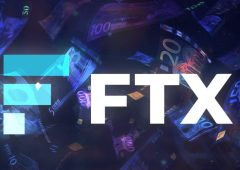Binance and Changpeng Zhao Face Legal Hurdles Following Supreme Court Decision
14.01.2025 14:30 2 min. read Kosta Gushterov
Binance and its founder Changpeng Zhao are now the focus of a class action lawsuit after the U.S. Supreme Court declined to hear their appeal on January 13.
The lawsuit accuses Binance of selling unregistered tokens that lost significant value, a move deemed actionable in the U.S. despite Binance’s claim of operating outside American jurisdiction.
The lawsuit alleges Binance failed to warn investors about the risks of several tokens, which were purchased in transactions finalized within the U.S. Binance, however, argued that U.S. securities laws shouldn’t apply to its platform as it’s not based in the country.
Binance and Zhao are also embroiled in a separate $1.8 billion lawsuit filed by FTX’s bankruptcy estate. The case involves a 2021 transaction where Binance sold a 20% stake in FTX back to the company for $1.7 billion in cryptocurrency, which FTX claims was fraudulent. Binance dismissed the allegations, calling them meritless.
Zhao faced further challenges earlier in 2024, pleading guilty to charges of failing to implement an anti-money laundering (AML) program. He admitted Binance facilitated illegal transactions and was sentenced to four months in prison. Zhao acknowledged his errors in court, saying, “I failed to implement adequate measures and understand the seriousness of that mistake.”
These legal challenges reflect growing scrutiny of Binance’s operations as global regulators push for more accountability in the cryptocurrency sector. With multiple cases pending, the future of Binance and its leadership remains uncertain amid mounting pressure to align with regulatory expectations.
-
1
Here’s How Much Elon Musk Has Lost Since Splitting from Trump
08.06.2025 16:00 1 min. read -
2
Circle Soars in NYSE Debut Amid Surging Stablecoin Interest — But Not Everyone’s Cheering
06.06.2025 11:00 2 min. read -
3
Yuga Labs Moves to Dismantle ApeCoin DAO in Favor of Centralized Structure
07.06.2025 15:00 2 min. read -
4
CETUS DEX Returns After Major Exploit, Faces Mixed Reaction from Users
09.06.2025 20:00 1 min. read -
5
Tether’s Hypothetical IPO Could Value It Above Coca-Cola, CEO Suggests
10.06.2025 11:00 1 min. read
SoFi Returns to Crypto with Trading, Staking, and Blockchain Transfers
Digital banking platform SoFi Technologies is making a strong return to the cryptocurrency space, relaunching its crypto trading and blockchain services after stepping away from the sector in late 2023.
Chinese Tech Firms Turn to Crypto for Treasury Diversification
Digital assets are gaining ground in corporate finance strategies, as more publicly traded companies embrace cryptocurrencies for treasury diversification.
Ripple Faces Legal Setback as Court Rejects Bid to Ease Penalties
Ripple has been dealt another legal blow after a federal judge rejected its attempt to ease court-imposed restrictions and penalties stemming from its long-standing battle with the U.S. Securities and Exchange Commission (SEC).
BIS Slams Stablecoins, Calls Them Ill-Suited for Modern Monetary Systems
Stablecoins are failing where it matters most, says the Bank for International Settlements (BIS), which sharply criticized the asset class in its latest annual report.
-
1
Here’s How Much Elon Musk Has Lost Since Splitting from Trump
08.06.2025 16:00 1 min. read -
2
Circle Soars in NYSE Debut Amid Surging Stablecoin Interest — But Not Everyone’s Cheering
06.06.2025 11:00 2 min. read -
3
Yuga Labs Moves to Dismantle ApeCoin DAO in Favor of Centralized Structure
07.06.2025 15:00 2 min. read -
4
CETUS DEX Returns After Major Exploit, Faces Mixed Reaction from Users
09.06.2025 20:00 1 min. read -
5
Tether’s Hypothetical IPO Could Value It Above Coca-Cola, CEO Suggests
10.06.2025 11:00 1 min. read


